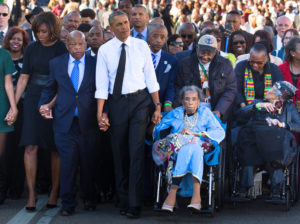
Amelia Boynton Robinson crossing the Edmund Pettus Bridge with President Obama in March. (Doug Mills/The New York Times)
Veteran civil rights activist Amelia Boynton Robinson has passed away at the age of 104. Her son, Bruce Boynton, announced she died on Wednesday.
Boynton Robinson was an eye witness to several pivotal moments in American history. She invited Dr. Martin Luther King to help rally local civil rights activists and also helped organize the Selma to Montgomery march. She was one of the marchers who were beaten by police officers on the Edmund Pettus Bridge, an incident depicted in the movie, Selma. Boynton Robinson’s role was portrayed by actress Lorraine Toussaint. While Boynton Robinson was pleased with Ava Duvernay’s Oscar-nominated Selma, she wasn’t happy with the way she was depicted in the Disney movie, Selma, Lord, Selma. She accused the movie of portraying her as a gospel-singing Aunt Jemima and later lost a lawsuit against the company.
During the Selma march, Boynton Robinson was pictured lying unconscious from her injuries in a photo that was flashed around the world. She later told The New York Post that she never wanted to become a martyr, but was willing to do whatever it took to advance civil rights.
“I wasn’t looking for notoriety,” she said. “But if that’s what it took, I didn’t care how many licks I got. It just made me even more determined to fight for our cause.”
Boynton Robinson was later invited to the White House by President Lyndon Johnson to witness the signing of the Civil Rights Act of 1965.
Fifty years later, her life came full circle, when she was wheeled across the Edmond Pettus Bridge holding hands with Barack Obama, the first Black president.
Obama said Boynton Robinson was a great role model for future generations.
“She was as strong, as hopeful and as indomitable of spirit — as quintessentially American — as I’m sure she was that day 50 years ago,” said Obama. “To honor the legacy of an American hero like Amelia Boynton requires only that we follow her example — that all of us fight to protect everyone’s right to vote.”
Boynton Robinson’s activism didn’t end with the civil rights movement. She got involved in politics and became the first Black woman to run on a democratic ticket in Alabama and the first Black woman to run for Congress in the state. Boynton Robinson didn’t win, but her campaign inspired others such as Rep. Terri Sewell, who said she was motivated by her run. Sewell invited Boynton Robinson to be her guest at the State of the Union speech.
“Mrs. Boynton Robinson suffered grave injustices on the Edmund Pettus Bridge in Selma at the hands of state troopers on Bloody Sunday, yet she refused to be intimidated,” Sewell said in January. “She marched with Dr. Martin Luther King, my colleague Rep. John Lewis and thousands of others from Selma to Montgomery and ultimately witnessed the day when their work led to the passage of the historic Voting Rights Act of 1965.”
Bruce Boynton told The AP his mother’s life was consumed by the civil rights movement.
“The truth of it is that was her entire life. That’s what she was completely taken with,” he said. “She was a loving person, very supportive — but civil rights was her life.”
Before she became a civil rights activist, Boynton Robinson was a demonstration agent with the U.S. Department of Agriculture, where she gave instruction on food, nutrition and homemaking in rural Dallas County, Ala. She was educated at the Tuskegee Institute (now Tuskegee University) where she studied under renowned botanist George Washington Carver, who was Bruce Boynton’s godfather.


